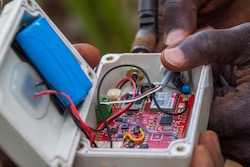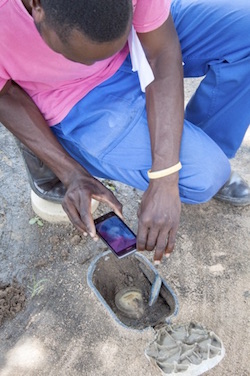This eLearning course explores emerging ICT trends, applications and experiences in WASH, and equips participants with a roadmap to design, develop and implement their own ICT-enabled solutions.
Target users
Target users are senior and middle managers and professional staff in water and sanitation utilities, in particular managing directors and the technical, commercial and ICT staff.
Also welcome are persons from national government entities, regulators, civil society and private sector organizations who seek to support utilities’ adoption of appropriate technologies to provide reliable and sustainable water and sanitation services.
Objectives and outcomes of the course
There is already a great deal of knowledge and experience in the application of ICTs for Development (ICT4D), but most of this exists outside of the WASH sector. Water Service Providers (WSPs) in particular have limited exposure to key ICT applications and experiences, and when they do, the focus is on the novelty of the innovations, rather than how they can be adopted to develop and improve institutional structures and meet objectives.
This e-Learning course will build the practical capacity of both the participants and the institutions they serve. Participants will critically evaluate and discuss emerging ICT trends, applications and experiences in WASH and other development sectors. Through analyzing and engaging in discourse around key successes and failures of other WSPs, as well as directly interacting with various ICTs (for example testing Android-based mobile data collection apps, and web-based geospatial apps and databases), participants will expand their own knowledge, be better equipped to overcome their own obstacles, and develop, implement and sustainably scale ICT solutions in their own utility.
Participants will ultimately take their ICT roadmap back to their utility to implement new initiatives that directly improve services provision, customer satisfaction, revenue collection, finances, and asset management. This course showcases WSPs who have done just this - harnessing low-cost ICT-enabled solutions to bring to light and resolve the most pressing challenges (especially uncontrolled NRW), then using this new cost-recovery to increase access to and better leverage financing for further advancement of the utility and people they serve. Whether it’s rectifying incorrect customer information, uncovering faulty meters, identifying errors in the billing system, exposing internal fraud, or digitally mapping network assets and customers, each utility will realize the benefits of joining this course.
Pre-Requisites to join
- Professional Background: Senior managers and professional staff in water and sanitation utilities, in particular Managing Directors and Technical, Commercial, and ICT Managers. Representatives from national government entities, regulators, civil society and private sector organizations with a vested interest in supporting the work of utilities.
- Workload: Around 6 hours per week in order to complete the course successfully.
- Technical Environment: Up-to-date browser, and a stable internet connection to access the multimedia course content and collaborate with other participants in live group webinars and online fora. Headphones are required for participation in the webinars.
- Participants should also have access to an android-based smartphone to partake in practical exercises which use various android applications.
- Language: This course is currently only offered in English, though in the future a French version might also be available. A B1-language level is required.
The preliminary table of contents (subject to changes) is available here:

